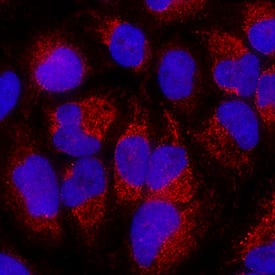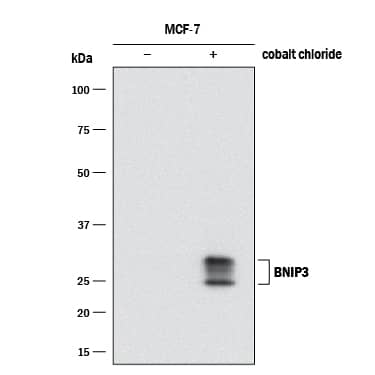Human BNIP3 Antibody
R&D Systems, part of Bio-Techne | Catalog # MAB41471

Key Product Details
Validated by
Biological Validation
Species Reactivity
Human
Applications
Immunocytochemistry, Western Blot
Label
Unconjugated
Antibody Source
Monoclonal Mouse IgG2A Clone # 670639
Product Specifications
Immunogen
E. coli-derived recombinant human BNIP3
Gly2-Ser160
Accession # Q12983
Gly2-Ser160
Accession # Q12983
Specificity
Detects human BNIP3 in direct ELISAs.
Clonality
Monoclonal
Host
Mouse
Isotype
IgG2A
Scientific Data Images for Human BNIP3 Antibody
Detection of Human BNIP3 by Western Blot.
Western blot shows lysates of MCF-7 human breast cancer cell line untreated (-) or treated (+) with CoCl2.PVDF membrane was probed with 0.5 µg/mL of Mouse Anti-Human BNIP3 Polyclonal Antibody (Catalog # MAB41471) followed by HRP-conjugated Anti-Mouse IgG Secondary Antibody (Catalog # HAF018). Specific bands were detected for BNIP3 at approximately 25-30 kDa (as indicated). This experiment was conducted under reducing conditions and using Immunoblot Buffer Group 1.BNIP3 in HeLa Human Cell Line.
BNIP3 was detected in immersion fixed HeLa human cervical epithelial carcinoma cell line using Mouse Anti-Human BNIP3 Polyclonal Antibody (Catalog # MAB41471) at 8 µg/mL for 3 hours at room temperature. Cells were stained using the NorthernLights™ 557-conjugated Anti-Mouse IgG Secondary Antibody (red; Catalog # NL007) and counterstained with DAPI (blue). Specific staining was localized to cytoplasm. View our protocol for Fluorescent ICC Staining of Cells on Coverslips.Applications for Human BNIP3 Antibody
Application
Recommended Usage
Immunocytochemistry
8-25 µg/mL
Sample: Immersion fixed HeLa human cervical epithelial carcinoma cell line
Sample: Immersion fixed HeLa human cervical epithelial carcinoma cell line
Western Blot
0.5 µg/mL
Sample: MCF‑7 human breast cancer cell line treated with CoCl2
Sample: MCF‑7 human breast cancer cell line treated with CoCl2
Reviewed Applications
Read 1 review rated 5 using MAB41471 in the following applications:
Formulation, Preparation, and Storage
Purification
Protein A or G purified from hybridoma culture supernatant
Reconstitution
Reconstitute at 0.5 mg/mL in sterile PBS. For liquid material, refer to CoA for concentration.
Formulation
Lyophilized from a 0.2 μm filtered solution in PBS with Trehalose. *Small pack size (SP) is supplied either lyophilized or as a 0.2 µm filtered solution in PBS.
Shipping
Lyophilized product is shipped at ambient temperature. Liquid small pack size (-SP) is shipped with polar packs. Upon receipt, store immediately at the temperature recommended below.
Stability & Storage
Use a manual defrost freezer and avoid repeated freeze-thaw cycles.
- 12 months from date of receipt, -20 to -70 °C as supplied.
- 1 month, 2 to 8 °C under sterile conditions after reconstitution.
- 6 months, -20 to -70 °C under sterile conditions after reconstitution.
Background: BNIP3
Long Name
BCL2/Adenovirus E1B 19 Kda Protein-Interacting Protein 3-Like
Alternate Names
Nip3
Gene Symbol
BNIP3
UniProt
Additional BNIP3 Products
Product Documents for Human BNIP3 Antibody
Product Specific Notices for Human BNIP3 Antibody
For research use only
